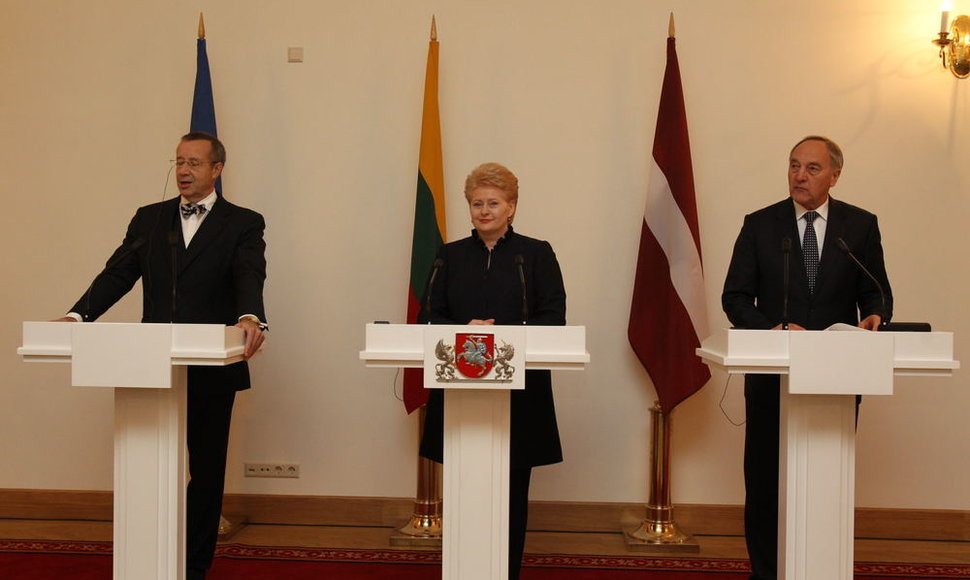The make-up of the president's advisory team became a subject of much speculation right after Grybauskaitė's election into office in 2009.
No need for big names
As her legal adviser, Grybauskaitė chose university lecturer Dr Solveiga Cirtautienė; ambassador Darius Semaška came to advise on foreign policies, Jonas Markevičius, deputy director of the Second Department of Operative Services at the Ministry of National Defence, on national security; Nerijus Udrėnas, SEB Bank senior analyst, on economy; former vice-minister of education Virginija Būdienė, on education and culture.
Journalist Linas Balsys was invited to be the president's spokesperson. The biggest surprise was the president's decision to put Audronė Nugaraitė, lecturer on journalism and a doctor in social sciences, in charge of political analysis and institutional liaisons.
After more than three years in office, only Markevičius, Udrėnas, and Būdienė are still part of the president's team. Cirtautienė was replaced by Rasa Svetikaitė, while Jovita Neliupšienė stepped in after Semaška was appointed ambassador to the Netherlands.
Balsys, who left the president because of differences of opinion and has been elected to parliament, was replaced by journalist Daiva Ulbinaitė. The post of Nugaraitė, who left her job at Daukanto Square after a year, remained unfilled and the entire Political Analysis and Institutional Liaisons Group that she led was dismissed.
After the election, Grybauskaitė used to say that her team was not the most important thing, since she was the one to be making decisions. “The only privilege of my advisers – long hours of hard work,” she said.
People to fill her team were hardly recognized experts, but relative newcomers to high politics.
Young and inexperienced
Political analyst Algis Krupavičius has not changed his opinion about the president's team of advisers over the three and a half years they have been working – they are, he says, young people short on academic, political, and life experience.
“Presidential teams usually consist of seasoned experts or politicians with considerable authority in their respective fields, people known to the society,” he tells 15min. “These people are shapers of political decisions. The president said she needed advisers to agree rather than advise, she'd be the one making decisions. In this respect, she is right – experts only make suggestions, presidents themselves bear the responsibility for decisions.”
“I am not saying hers is a bad team, there's just a shortage of balance between knowledge and experience. That might be one of the reasons why our foreign policies have been so directionless,” the political scientist says.
Observers note that the disappearance of the Political Analysis and Institutional Liaisons Group has compromised the president's ability to effectively communicate with parliament and the government. Her press service usually makes comments on domestic policy issues. According to Krupavičius, that might be one of the reasons behind the prolonged cabinet formation following last year's general elections: “The president's office was sending wrong signals and antagonising politicians.”
Solid Eastonians
Toomas Hendrik Ilves, who was re-elected as Estonia's president in 2011, kept most of his team from the previous term. The president's office is run by Siim Raie, a long-time CEO of the Estonian Chamber of Commerce and Industry and adviser to the Council of the Baltic Sea States.
Previous adviser on legal affairs Aaro Mõttus was replaced by Ülle Madise four years ago. Before that, the social science doctor ran the National Audit Council. She is a recognized legal expert and one of the best-known officers in Estonia, often invited to political talk shows to give her expert opinion.
Adviser on foreign policies Margus Laidre is a well-known historian, PhD, author of numerous books on the history of diplomacy, former ambassador.
Back in 2006, the Estonian president invited Toomas Sildam, a celebrated journalist and editor of the daily Postimees, to be his spokesperson. The most recent addition to the president's team is Iivi Anna Masso, an intellectual of some renown among the trans-Atlantic community, editor of Diplomaatia, Estonia's only foreign policy publication, and regular columnist for Postimees.
After his second victory, Ilves invited Andres Vosman, officer at the Ministry of Defence and former adviser at Estonia's representation to NATO, to be his adviser on security. Last year, Vosman was replaced by Merle Maigre, whose CV includes a position at the office of NATO Secretary General.
Trust in lawyers
Andris Bērziņš, who was elected Latvia's president in 2011, entrusted his office to Gundars Daudze, former deputy speaker of the Saeima.
Dr Marģers Krams, who advises the president on foreign policies, used to be Latvia's ambassador in Canada and the World Trade Organization.
Legal adviser Edgars Pastars, who is about to leave the post, is one of the most respected new-generation lawyers. His experience includes advising to many state institutions. National security adviser Janis Maizitis, secretary of the National Security Council, also has a degree in law and used to work as Latvia's prosecutor general.
As his spokesperson, the president invited Liga Krapane, who held a similar post in the team of Prime Minister Valdis Dombrovskis.
Prestigious job
Argo Ideon, politics and economy reporter for Postimees:
“The Estonian president's advisers are reputable professionals who are well known in the society and have some solid experience and training. The job is seen as very prestigious, not everyone can get it. Before, perhaps, the image of the president's advisers was not as good. For instance, national security adviser to previous president Lennart Meri, Eerik Niiles Kross (diplomat, intelligence expert, businessman and politician) was a rather controversial figure. He also used to advise to the Georgian government, so was not much liked in Russia.”
Advisers not a cure-all
Tomas Ostrovskis, deputy editor-in-chief of tvnet.lv:
“Latvia's President Andris Bērziņš is quite well-regarded in the society, but not so much for his own personality as for the office he occupies. This should provide ample opportunity for an expert team of advisers to do some good groundwork, shouldn't it? In our case, the rule is more than confirmed. A widely-held opinion has it that Bērziņš is the weakest of the three Baltic presidents. In international affairs, he gets all his statements written for him on paper, but in domestic policies, one public relations mistake follows another. It gets even worse when the president decides to ignore the opinion of his advisers. The greatest blow to his already sinking reputation was given last September, when the president attacked reporters in the presence of his minor son. For his advisers, that means crisis management 365 days a year.”















